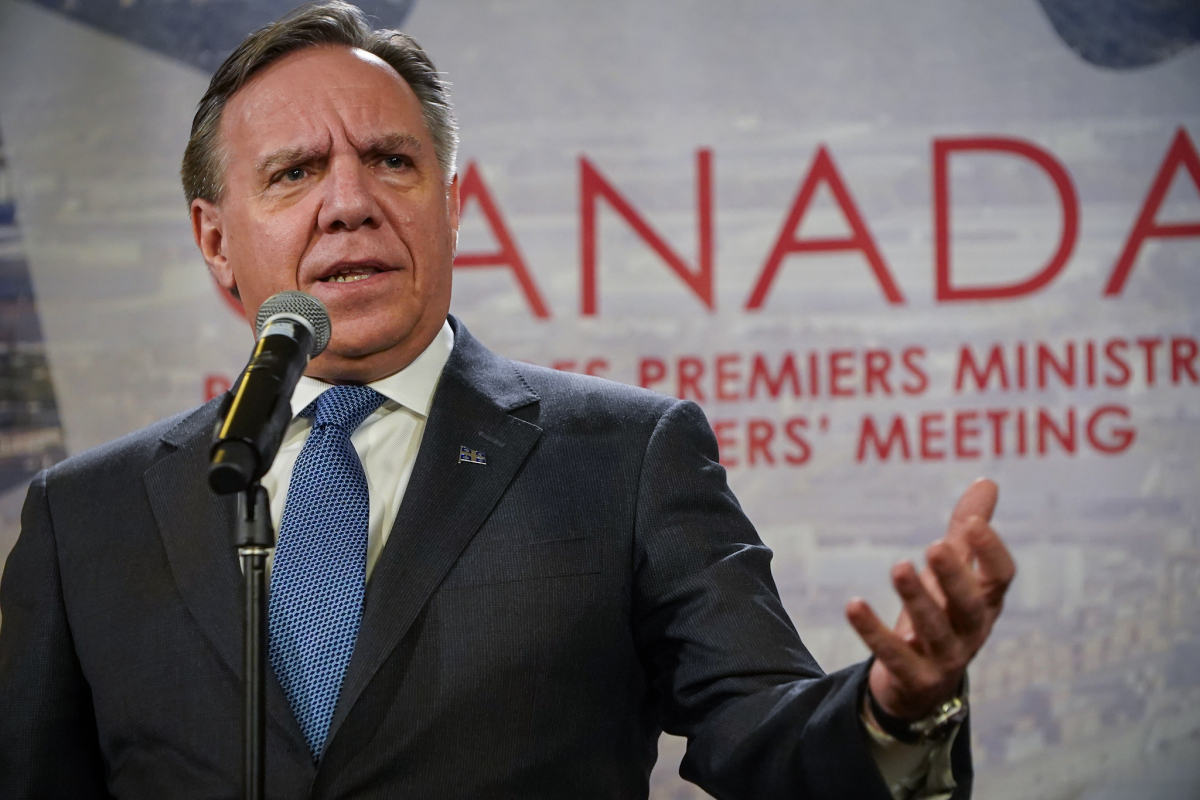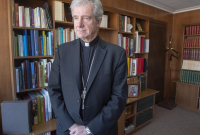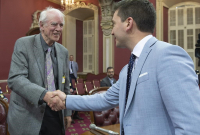Support strong Canadian climate journalism for 2025
For the first time in the history of Quebec, the provincial government has no senior ministers and only two elected representatives from the island of Montreal, and it shows.
Nothing makes this more evident than Bill 21, the secularism law proposed by the Coalition Avenir Québec (CAQ) government that is especially contentious for banning certain public workers from wearing religious symbols. Notable among them are teachers and school principals, police officers, judges, Crown prosecutors and prison guards.
In an attempt to pre-empt litigation, the government has invoked the notwithstanding clause that allows the Government of Quebec to override portions of the Quebec Charter of Human Rights and Freedoms and the Canadian Charter of Rights and Freedoms.
Putting a lid on debate on the bill, the CAQ limited public hearings to six days, ending May 16, 2019. The CAQ indicated it would use closure to limit debate in the legislature, in hopes of speedy adoption by June 15 at the latest.
On April 15, 2019, Montreal City Council in rare unanimity adopted a resolution condemning Bill 21. The resolution was introduced by Lionel Perez, who wears a kippa and is the leader of the opposition Ensemble Montreal. Perez said he is as Québécois as any other resident of Quebec and was warmly applauded by council members. Shortly before the meeting, Mayor Valérie Plante and Perez held a joint press conference to present their common position.
Proposed law generating tensions
Testifying at legislative hearings on May 14, 2019, Plante made a passionate plea on grounds the law stigmatizes the most vulnerable women in society. She noted that unemployment among female immigrants in Quebec is twice that of other women. She said the bill generates tensions in the province. Plante also said the law would be difficult to apply because it is unclear what is meant by religious symbols. She argued against using the notwithstanding clause, saying the law should be solid enough to withstand challenges in the courts.
Montreal’s largest and most multicultural francophone school board in Quebec, Commission scolaire de Montréal (CSDM), produced a report implying Bill 21 cannot be implemented without creating an unmanageable administrative burden that could not be justified. The board declared that the bill doesn’t correspond with reality in that it has many employees who are not teachers and would not be subject to the legislation. Among them are specialists in learning disabilities and day care service providers. That was echoed at the legislative hearings by Alain Fortier of the Fédération des commissions scolaires du Québec, (Quebec school board federation).
Jean-Claude Hébert, a criminal lawyer and a familiar face in Quebec francophone media, indicated that jurisprudence is such that the proposed law would be the object of many court battles despite the notwithstanding clause.
Pierre Bosset, a jurist from the Université du Québec à Montréal, noted that while changes to the Quebec Charter of Human Rights and Freedoms have been based on substantive research and unanimous or near unanimous support in the National Assembly, such is not the case with Bill 21.
At the hearings on May 8, Gérald Bouchard, who co-presided over the 2007 hearings on Bouchard-Taylor Commission on reasonable accommodations, concurred with the City of Montreal that CAQ had not justified the use of the notwithstanding clause. Bouchard argued that the government had offered absolutely no evidence to support assertions by Premier François Legault and Simon Jolin-Barrette, minister of inclusion, diversity and immigration, that the wearing of religious symbols by teachers constitutes religious indoctrination on impressionable children.
Settling accounts with a bygone era
In a response to Bouchard’s testimony at the Parliamentary hearings, Guy Rocher, a 95-year-old sociologist who is well-known in Quebec, insisted that permitting religious symbols in schools would lead to a return to the era of the defunct confessional school systems. In that era school boards were based on either the Catholic or Protestant religions, rather than language, as they are today.
Rocher claimed that Quebec, having experienced an era when highly visible Catholic religious symbols were worn by teachers, must not risk having a dictatorship of minority religions imposed on the majority. But Rocher did not offer any evidence to support his conclusions, saying the methodology and data on this matter do not exist.
Yet many in Quebec’s francophone community share this fear, having had the Church-ridden era embedded in their psyche the way residential schools are ingrained in the memories of Canada’s Aboriginal communities. For many older francophones, Bill 21 is a matter of settling accounts with a bygone Catholic monopoly on the francophone school system. A perverse impact of Bill 21 could be more children going to private confessional schools where the legislation does not apply, despite public subsidies.
Bouchard said the notwithstanding clause should only be used for exceptional situations to better protect rights, such as the language legislation to assure the survival of French as the language of the majority in Quebec, in the North American context. Bill 21 suppresses rights, thus portraying Quebec as disrespectful of a decent democratic society, he said. Evidence of a tarnished international portrait of Quebec is in reports by the New York Times, The Washington Post and The Guardian. Bouchard projected that the bill would cultivate tensions between francophone and non-francophone communities.
Bouchard’s analyses of tensions are reflected in an Angus-Reid survey showing that while 64 per cent of Quebecers support the proposed bill, 57 per cent don’t think the ban should be applied to someone wearing a crucifix. By contrast, only seven per cent think that a hijab should be exempt from a ban. This Islamophobia indicator was confirmed by Charles Taylor, of the above noted Bouchard-Taylor Commission and professor emeritus at McGill University. He said Bill 21 has fueled toxic comments about Muslims in social media and warned that studies show hate incidents were encouraged by election campaigns based on ethnic restrictions in France, the United States and the United Kingdom.
Geographical and generational divides
Also, differences in levels of xenophobia are inter-generational, in addition to reflecting a divide between Montreal and other regions of the province.
The Confédération des syndicats nationaux (CSN), one of the largest unions in Québec, expressed opposition at the legislative hearings to applying Bill 21 to teachers. When questioned as to why the CSN supported the 2013 Parti Québécois proposed secular legislation, the Charter of Values, CSN president Jacques Létourneau said it is a generational thing, the new wave of CSN people having replaced older activists. A CROP survey supports this analysis, with support for Bill 21 restrictions on teachers at 55-56 per cent of those older than 55, much higher than the 28 per cent among respondents aged 18-34.
On a May 6 segment of Le Téléjournal, the Radio-Canada equivalent to the CBC national news, the views of multicultural adolescents in a Montreal francophone school were compared with those of a francophone school in the small municipalitiy of Matane in Eastern Quebec. The Montreal students totally opposed Bill 21 application to teachers while the Matane students were divided. Those against Bill 21 in the Matane group conveyed it is an inter-generational difference of opinion, the older generation fearing a return of confessional schools while the current generation of students have no such fears.
A poll showed differences among the non-francophone minority and the francophone majority. Inclusion of teachers in the religious symbol ban is supported by 69 per cent of francophones but only 22-23 per cent of non-francophones. Only 22 per cent of francophones have a positive opinion on wearing the hijab, whereas 46 per cent of anglophones and 52 of allophones (groups other than francophones and anglophones) share a positive opinion.
A contributing factor to the linguistic contrast is that most of Quebec’s regions are nearly entirely francophone with very few immigrants, while Montreal is multicultural. It is important to make a linguistic clarification here in that francophones in multicultural Montreal are not necessarily aligned with francophones in regions, as is evident in the city of Montreal’s unanimous resolution, by francophone and non-francophone representatives alike, opposing Bill 21.
At the hearings on May 14, the Quebec English School Boards Association (QESBA) pledged to contest the legislation based on a 1990 Supreme Court of Canada decision in Mahé v. Alberta. The court ruled that minority education rights are such that, French-language schools in Alberta had full authority to recruit and assign teachers and other personnel, as they see fit. The QESBA argued that the Bill 21 notwithstanding clause would not hold up to article 23 on minority rights in the Canadian Charter of Rights and Freedoms. This could be a Pandora’s Box that would bring down the law.
Ironically, the law would encourage new arrivals to associate with the anglophone community where they would be more readily accepted as equals. That is, the consequences of implementing Bill 21 could undermine the goals of Quebec parties of all stripes to make Quebec as much a multicultural francophone society where French is the common language of use in a mixed mother-tongue context, as English is the common language of use in multicultural English Canada.
Immigration quotas compound divisions
Compounding the divisiveness, the CAQ wants to reduce the quota of new immigrants received per year by 20 per cent, which Mayor Plante strongly opposes. She highlighted Quebec’s shortage of employees to fill vacant positions as an impediment to economic development. The vast majority of new immigrants to Quebec, 90 per cent, take up residence in the Montreal area. But Labour Minister Jean Boulet prefers to address the matter with incentives for those aged 60 and older, to stay at their job, or return to work from retirement.
Plante is at odds with the CAQ government on transportation too. The first CAQ budget allocated 70 per cent of transport financing to road construction and 30 per cent to public transit. Plante’s position is this ratio should be inverted, similar to that in Ontario. CAQ’s priority is to widen and prolong major highways and add a third link across the St. Lawrence River between Quebec and its southern suburb Lévis.
Regarding the expansion of a planned 67-kilometre light train network, Réseau Express Montréal (REM), the CAQ administration said it will have the last word. The government prefers expansion to the suburbs where CAQ candidates won seats, instead of adhering to a long-term plan of the Montreal regional transport organization made up of elected representatives, l’Autorité régionale de transport métropolitain (ARTM).
The government position is that the ARTM should have an advisory role only. Plante wants the ARTM to be in charge, having indicated that the CAQ plans would increase overcrowding on the subway network. In her election campaign, Plante proposed a Métro Pink Line, from a station in northwest Montreal to Lachine in the southwest, to relieve saturation on a line from suburban Laval to downtown. Premier Legault dismissed this option, although CAQ may be softening its stance by committing $5 million to study solutions to congestion during peak hours on the eastern Orange Line.
Combining CAQ transport and immigration dividing lines, under Bill 17, CAQ plans to allow anyone to provide a taxi service in Quebec. This initiative would bring an abrupt end to the system of taxi permits which controls the supply of taxis to assure Quebec’s taxi drivers, particularly in Montreal, can make a decent living. As it happens, many Montreal taxi drivers are immigrants.
The Bureau de Taxi de Montréal and the City of Montreal are on the same wavelength against Bill 17, but Quebec Transport Minister François Bonnardel wants the free market to prevail. And similar to the scenario with Bill 21 on secularism, CAQ offered no evidence to substantiate its position while the government’s own preliminary report concluded Bill 17 would spell the demise of the industry.
When one puts pieces of the puzzle together, it is clear that the CAQ wants to impose its own inward-looking nationalism, dividing Quebec as never before, with multicultural Montreal and millennials to suffer the consequences.





Comments
Thank you Will Dubitsky for this article. I live in Western Canada, the real West as in British Columbia, and we don't get many stories from Quebec that help us understand the issues that matter to the people who live there. The isolation of Montreal and of millennials by the CAQ is a big issue. Please write more about this.
Just to bring some balance to Mr. Dubitsky's article, there are many anglo Montrearlers, myself included, who believe that courtrooms and classrooms are no place for religious expression, which is a form of promotion. It is clear that in these institutions there would be no acceptance of overt political expression ie. wearing a political party T-shirst, or having marxist, socialist, or any other political symbol. The same applies to religion. Quebec has a long history of religious domination and abuse by the Catholic Church and has decided that government structures, such as schools should follow the principal of laicity, meaning lack of religion. There are practicing Jews, Muslims, Catholics etc. who choose to not wear a religious symbols and if they want to work at police officers, judges, teachers etc. they have to respect that form of neutrality. If they choose not to accept those requirements, then that is their choice to not work there.
Actually, this is a facile and simplistic analysis filtered through the usual "what does Québec want" funnel.
The next contributor, Trevor, hits the nail on the head.
There are a great many people in MTL, including anglophones and allophones, who have been browbeaten, blackmailed and intimidated into silence...for the moment. the authoritarian Mme. Plante (I have been a member of her party) has no mandate for what she says. That hasn't stopped her before on other subjects.
Meanwhile in Iran, every Wednesday since Jan. 31 2018, courageous women have stood silently on street corners holding their hijabs on the end of a stick, like a dead rat or a puppet without strings, and a number of men go around in hijabs to show support them.
We do not intend to betray them.